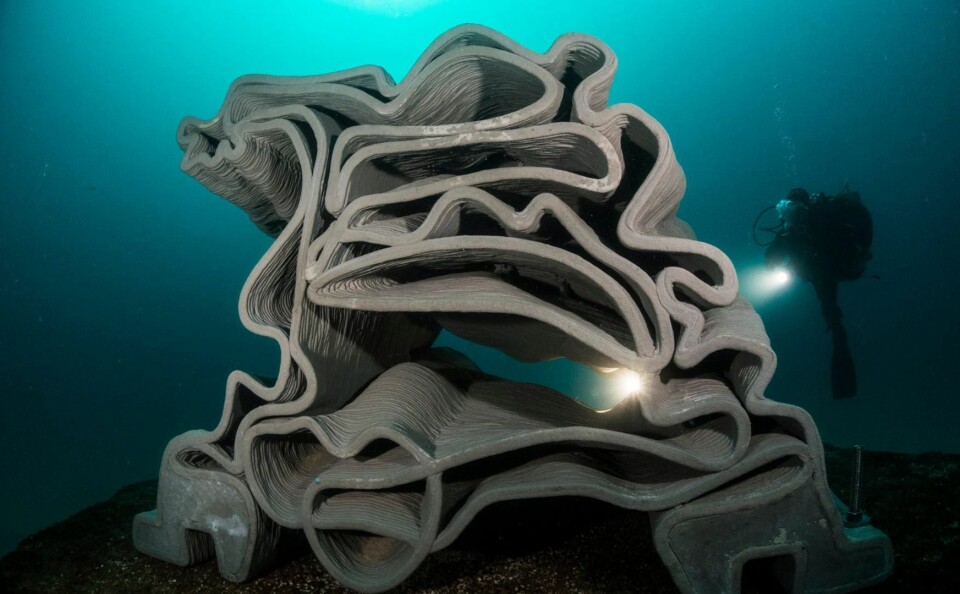-
Pistes closed, confinement orders: Alpine resorts deal with avalanche risk
Increased snowfall this weekend may cause further closures as busy school holiday season continues
-
Is this the end of free mountain rescue in France?
A new report says that charging for services is ‘legitimate and necessary’
-
AI usage on the rise in France but lags behind UK and US
Uptick in generative AI usage outpaces smartphone and internet adoption across similar timeframe
Green news France: tobacco firm butt tax, 3D printed scuba reef
And an ice-rink in Niort is melted to water trees - we look at current initiatives aimed at supporting the environment

After a three-year construction programme, the largest 3D printed concrete artificial reef in the world has been laid at the seaside resort of Agde, Hérault.
The 105-tonne, 6.5m-high reef, whose structure is directly inspired by the natural habitats of the seabed, is primarily intended for scuba diving – the intention being to relieve other natural sites of the damaging impact of poorly controlled diving activities and to protect fragile environments.
Fish and tourism win
The reef is the latest batch produced by the Recif’lab project for the area’s coastline – in 2019, about 30 artificial reefs of fish nurseries ordered by city authorities were immersed over 300 metres down.
“It’s a win-win,” said Renaud Dupuy de la Granderive, director of the marine protected area.
“We do something to protect the marine environment and at the same time, we have an activity par excellence that we can develop in Cap d’Agde’s tourist areas.”
Agde had won a national ‘future investment’ programme led by the Ministry of Ecological Transition, with €600,000 invested by the State and local authorities.
Rinks and pools emptied to combat drought
Authorities in the Deux-Sèvres prefecture of Niort have taken a drastic measure in response to this summer’s drought alert: they have melted the municipal ice-skating rink (patinoire) in order to use the water on the town’s green spaces.
“We have 80m³ of water to drain from the rink. Usually, this water is not saved and it goes into the sewers,” local head of green spaces, Manuel Gasnier, told Francetvinfo.
Some 6,000 trees were planted over the winter in order to make heatwaves more bearable for locals.
“We want to provide the public with cool zones during heat waves,” said community official Philippe Mauffrey.
However, the young trees are already suffering from lack of water.
The town’s six public swimming pools will also be emptied so that the drained water can be used for watering.
“It allows us to water all the trees we planted this year,” said Anthony Brémand, the city’s head gardener.
Après-ski season clean up success
Every year in early summer, once the last snow has melted in the highest ski resorts and villages of the Alps, mass clean-ups begin to rid the streets, slopes and forests of waste deposited by winter visitors.
One such clean-up took place in early June in Chamrousse (Isère), where around 50 volunteers amassed 274 kilos of waste – despite heavy rain and temperatures that never got above 7°C.
They spent four hours gathering discarded Covid face masks, cigarette butts, tissues and plastic packaging.
No butts, it’s got to be better
While companies that make items such as batteries and electrical appliances are already decreed by a 1975 law to take responsibility for the end-of-life disposal of their products, by 2025, 11 more product ‘families’ will be concerned by the law, including cigarette butts.
Thanks to the new AGEC law that features measures against waste, promoting the circular economy and ensuring producer responsibility, French cities will be able to collect between 50 cents and €2 per inhabitant from cigarette manufacturers, depending on the density of their municipalities.
The ‘tax’ will go towards financing the cleaning of streets and roads of mégots (cigarette butts).
The tobacco industry is already committed to eco-friendly measures that include raising public awareness, the provision of more urban ashtrays, and the recycling of butts.
Related articles
Green news France: Wind farm angers fishermen, €8M water reuse pledge
French environment news: tree valuations, wonky veg, pesticides in tea
US firm to build ‘hard-to-treat’ plastic recycling plant in France
























